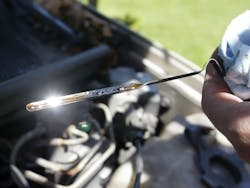One of the things that I enjoy the most about what we do is working with the customer facing advisors. Some of you call them CSAs, service advisors or salesperson. No matter what they are to you, they are basically the lifeblood of your business. What do you think the most important thing that they sell? Well, hello, you are reading the National Oil and Lube News!
Your customers came to see you for this fluid change and everything you do on top of that is just icing. So, do your advisors know the how, what and when of your lifeblood?
Before we get started on types of oil and when to offer each, let us talk about oil itself. Engine oil is designed to lubricate the inner components of internal combustion engines, as well as to protect them against corrosion and keep them cool while in use. It’s made from two main elements: base stock and additives.
The base stock commonly makes up 95 percent of the solution and is either made from petroleum, synthetic chemicals, or a mixture of the two. The base stock is responsible for lubricating an engine’s moving parts and removing built-up heat.
The additives, meanwhile, account for roughly five per cent of the oil and it is these chemicals that are responsible for finely controlling oil viscosity and lubricity, as well as protecting engine parts against wear.
Alright, alright, science class is over. You all know what oil does! Let us jump into the different variations and when you should recommend them to your customer.
Conventional—Base Oil
To begin, conventional oils are generally your base price oils. This is what your customer will pick if you just say, “What kind of oil do you want to use?” We all know that this is a good oil. It will do the job. But it will not add anything to your daily sales numbers, and it may not be the right oil for your customer’s ride.
There are three more choices that most of you carry that will be better for your customer and for your bottom line. The only reason that I talk about this in my store locations is if you ask for it. I will always start with the best option for your ride.
Synthetic—Top Choice
Today, more manufacturers are requiring the use of synthetic motor oils. Always use synthetic motor oil if your vehicle requires it. Even if your vehicle does not require synthetic or synthetic blend motor oil keep in mind that both generally provide better protection under extreme conditions than conventional oils.
First off, synthetic oil is better than conventional oil when it comes to its form and function. Conventional oil could never stand up to synthetic when it comes to longevity and ability to handle extreme high temperatures without breaking down.
With today’s technology, synthetics are cleaner and meaner. Synthetics have also been shown to produce less resistance in the engine and therefore offer more horsepower and overall efficiency for the engine. This added horsepower in return means that the engine will be able to perform at the same level as before, while using slightly less gas. For all cars, except rotary engines, this is the top choice for protection and performance.
Blended—Best of Both Worlds (For the Price)
The mid-tier is called blended oil because it mixes the two together to give you a moderately better oil at better cost to you. These do not quite have the longevity of the full synthetics, so it really all comes out in the wash in the end. These are good oils for customers that drive over their mileage intervals, may tow from time to time or just want to move up to a better oil, but does not want to spend an arm and a leg. I will move to this option if you do not want to run a full synthetic.
High-Mileage Oils
Once a vehicle reaches approximately 75,000 miles, it is recommended by may oil manufacturers to move to a high mileage oil. These can come in synthetic and blended formulas. But what is the benefit to making this move? High mileage oils contain seal conditioners and additives that cause O-rings, gaskets and seals to swell. In some cases, older valve-guide seals in engines may have reduced seepage.
This can result in lower oil consumption. Many high mileage motor oils include detergents and claim they are designed to remove sludge from engines. If you see an engine with some slight oil leaks or over the mileage, drop this option for an upgrade option. If I look at your history, unless you are already in a full synthetic, I am going here. It is just the right thing for your higher mileage vehicle.
Always refer to the products that you carry and what your company standards are. Some places do not carry blends, and some do not carry conventional. Use your digital training options.
Pennzoil, Valvoline, Castrol and more have reference materials online to help you get more education on your companies selected fluid. In the end, knowing what the oils are and how they are designed will help you make the right selection with your customer. When you are standing there with a customer you are the expert. Instead of asking what they want, give them the best option, and watch those sales rise each and every day.
About the Author

Adam Tatum
Adam Tatum is the Director of Operations for Virginia Lubes, a Jiffy Lube franchisee with 11 locations. He has over a decade of experience in the industry with a proven track record of building customer counts and sales, as well as using innovative ways to bring a new look to the automotive field for both the customer and the employee. Performance comes from growing your business through people.
